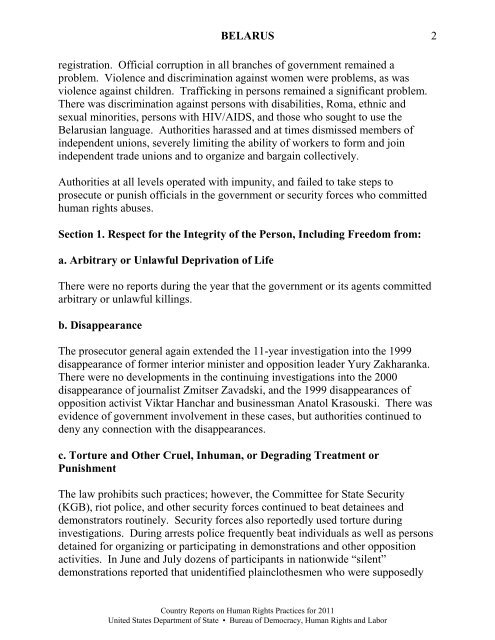belarus executive summary - US Department of State
belarus executive summary - US Department of State
belarus executive summary - US Department of State
You also want an ePaper? Increase the reach of your titles
YUMPU automatically turns print PDFs into web optimized ePapers that Google loves.
BELAR<strong>US</strong> 2<br />
registration. Official corruption in all branches <strong>of</strong> government remained a<br />
problem. Violence and discrimination against women were problems, as was<br />
violence against children. Trafficking in persons remained a significant problem.<br />
There was discrimination against persons with disabilities, Roma, ethnic and<br />
sexual minorities, persons with HIV/AIDS, and those who sought to use the<br />
Belarusian language. Authorities harassed and at times dismissed members <strong>of</strong><br />
independent unions, severely limiting the ability <strong>of</strong> workers to form and join<br />
independent trade unions and to organize and bargain collectively.<br />
Authorities at all levels operated with impunity, and failed to take steps to<br />
prosecute or punish <strong>of</strong>ficials in the government or security forces who committed<br />
human rights abuses.<br />
Section 1. Respect for the Integrity <strong>of</strong> the Person, Including Freedom from:<br />
a. Arbitrary or Unlawful Deprivation <strong>of</strong> Life<br />
There were no reports during the year that the government or its agents committed<br />
arbitrary or unlawful killings.<br />
b. Disappearance<br />
The prosecutor general again extended the 11-year investigation into the 1999<br />
disappearance <strong>of</strong> former interior minister and opposition leader Yury Zakharanka.<br />
There were no developments in the continuing investigations into the 2000<br />
disappearance <strong>of</strong> journalist Zmitser Zavadski, and the 1999 disappearances <strong>of</strong><br />
opposition activist Viktar Hanchar and businessman Anatol Krasouski. There was<br />
evidence <strong>of</strong> government involvement in these cases, but authorities continued to<br />
deny any connection with the disappearances.<br />
c. Torture and Other Cruel, Inhuman, or Degrading Treatment or<br />
Punishment<br />
The law prohibits such practices; however, the Committee for <strong>State</strong> Security<br />
(KGB), riot police, and other security forces continued to beat detainees and<br />
demonstrators routinely. Security forces also reportedly used torture during<br />
investigations. During arrests police frequently beat individuals as well as persons<br />
detained for organizing or participating in demonstrations and other opposition<br />
activities. In June and July dozens <strong>of</strong> participants in nationwide “silent”<br />
demonstrations reported that unidentified plainclothesmen who were supposedly<br />
Country Reports on Human Rights Practices for 2011<br />
United <strong>State</strong>s <strong>Department</strong> <strong>of</strong> <strong>State</strong> • Bureau <strong>of</strong> Democracy, Human Rights and Labor
















